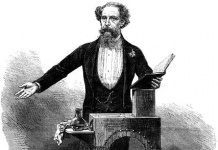 There have been a couple of very public effusions—and counterblasts—recently by and about the writers stepping onto the self-promotion treadmill as part of the new post-Kindle slog of selling your books and your self, self-published or otherwise.
There have been a couple of very public effusions—and counterblasts—recently by and about the writers stepping onto the self-promotion treadmill as part of the new post-Kindle slog of selling your books and your self, self-published or otherwise.
First of all there was first-time novelist Anakana Schofield—not self-published, by the way, but published in the UK by OneWorld, talking in The Guardian about the woes of promoting her book, “Malarky.” Then there was book promotion PR professional Ruth Killick answering Anakana, and explaining “Why authors need to join the PR circus.” And now we have Sean Beaudoin in Salon—but originally published in The Weeklings, which seems to be the venue of choice lately for self-pitying, self-referential, self-promotional rants, complaining that “Hell is self-promotion.” Well, really?
I suppose Beaudoin hasn’t spent too much time in the suburbs of Damascus lately, or in Durango, but his definition of hell seems a little slanted, not to say self-serving. “I have 975 followers on Twitter, an embarrassing pittance for anyone trying to move units,” he complains. Oops, guess I should shovel my measly 43 Twitter followers under the carpet fast, or face death by social media humiliation. Well, shift those frikkin units, eh.
“Why can’t I get paid for many of the articles I write? (Though I am getting paid for this one.)” complains Schofield. Then why not choose the venues where you will get paid, and don’t write for the rest? And above all, where is the problem in saying no? If the contract imposes draconian requirements about marketing obligations, perhaps where the new writer really needs to start is looking more closely at those clauses—or working out a more pro-active relationship with their publicist.
“Many authors think quite reasonably that they’ve done their job in writing the book. It’s disconcerting to find that they are then expected to promote it,” writes Killick. And she rightly draws the comparison with Charles Dickens, and his relentless schedule of public readings, appearances, tours, etc. This rather begs the question of Beaudoin’s version of events: “Publishers used to do most of the marketing for the books they put out. The best an author could do was finish the last chapter and then show up reasonably sober for a tri-city book tour. The hope was that the book would eventually be widely reviewed, and then take off on the strength of word-of-mouth. But social media has crushed that seemingly innocent past.”
What innocent past? Dickens evidently didn’t have one. And I’m sure Anthony Trollope‘s grinding schedule of productivity was about more than just the Victorian work ethic—it was as much about staying in the public eye and feeding the machine as any modern-day Twitter grind.
I’m sure I’m being intolerant and dismissive by saying that authors have been feather-bedded and have had it easy for too long, but to see those who are in print griping about the dreadful burdens that publication imposes on them does invite a curled lip. Above all, it does invite another question: Why are you doing this just for the money? If this is all about greed, go do something else. If you have something to say, why are you complaining about having the opportunity to say it, again and again, to your heart’s content?
Dickens definitely had something more than an appetite for the limelight and a fear of sliding back into poverty: He had convictions. He had views, ideas, and emotions that he felt were worth transmitting and conveying to the public at large, above and beyond his own personal position as a writer or even a public figure. Raising money for Great Ormond Street Hospital was just one of the many causes and public reforms he advanced, both directly and indirectly. These writers and the PR pros alike could learn a lot from that. And if public spirit isn’t your thing, what about the private joy of writing and the sheer pleasure of enriching the language?
“The great white hope of writing is to reach the point where you no longer have to pimp yourself at all,” says Beaudoin. Pimping: Is that really his take on what talking and communicating as a writer is about? If all you have to keep you going as a writer is your greed, yearning for celebrity, and self-regard, then the social media self-promotional grind is exactly the hell you deserve. And the ever-hungry mechanisms of modern media will take everything you can churn out. Good luck flogging yourself to death that way.


































Self-promotion… a wonderful opportunity to talk about yourself and your work with anyone and everyone who will listen on every possible medium. Four books later, I have never been “feather-bedded” by anyone – it’s more like a bed of nails, once I’ve walked over the path of hot coals… just to be heard and acknowledged. Not the slightest bit embarrassed to talk about myself and my books with my 71 Twitter followers and my 134 Facebook friends, I post fun interesting messages every day in the hope they too will show support and share. And now for the shameless self-plug: http://rkthb.co/29941
Hear, hear! I get tired of the complaining too—if you are a professional writer and this is your job and not just a hobby, this is part of it. And really, don’t all jobs have less fun parts? For instance, I love being a teacher and I work with some fabulous colleagues, but I challenge you to find a one among us who *loves* playground duty…
The thing about this post that I’m struggling with is how angry it seems. I mean, seriously — it ends “Good luck flogging yourself to death that way.”
Why the anger?
Let me break this down for you: some people are perhaps a little naive. They think after struggling to write a decent manuscript, then struggling to get an agent, then waiting while the agent gets a publisher, then working (i.e.: struggling) with their editor to get delivery and acceptance of a final draft — that maybe they can relax and work on the next one.
This, it turns out, is naive. And the thing is, not everyone is cut out for self-promotion (as Charles Dickens, and what an excellent example, by the way, definitely was). Some writers are terrible at this; some even have some social anxieties. It’s fun to think of which authors from the old days wouldn’t fit in with the current model of book promotion. Can you imagine J.D. Salinger podcasting, Facebooking and Tweeting up a storm? Would a publisher even take him on if he just wanted to … you know… write?
I’m not even saying that these new social media demands on writers are unreasonable. I’m just, frankly, curious as to why, Paul, you’re so upset that Anakana Schofield and Sean Beaudoin balk at social media promotion? Some do that with more joy than others. No biggie.
David, my problem, not so much with Anakana, who yes, may have been somewhat naive (although entertainingly eloquent about it), but with Beaudoin, is balking at social media promotion in a long and detailed article devoted to self-promotion. Smacks of hypocrisy to me.
Surely the point is a slightly different one, which is that over the last decade or so, authors have seen (1) a sharp and continuing decline in advances from publishers and (2) an increased expectation that authors will do social media, blogging & other digital extras.
I don’t know the stats in the US, but the last reasonable survey in Britain estimated the median income of a professional novelist at about £13,000 (or, around $20,000). Since that survey was conducted, advances have fallen further. It’s also true to say that careers have become more perilous. I’ve been an author for fifteen years. My current advance from my British publisher is almost exactly 50% of what it was back in 1998. That’s not an inflation-adjusted 50%; just 50%.
I’m not actually complaining about any of this. It is what it is (and, in fact, my own career is doing just fine. I sell to more overseas publishers, and have sold film rights, and have other irons in other fires. My books are doing nicely too.) But authors in general do have a legitimate gripe about a publishing industry that is willing to pay increasingly derisory amounts and yet demand more work for the pay. Sure, authors could simply do something different. But don’t publishers also have some kind of responsibility to pay fairly? If they committed to pay at least minimum wage, plenty of authors would be better off.
I think there’s more than one writing world – I don’t know any writers that have been feather-bedded. I don’t know any writers who have had it easy – and I know hundreds. Whatever world of writing the author of this article inhabits, I’d like to visit it, if only out of curiosity to see what life is like on an alien planet.
Just to explain a little – one thing that I find bewildering about this article is that it seems to be opposing the view of Anakana Schofield (I haven’t read Beaudoin’s article, so can’t comment on that), but goes on to say that writers should be less greedy. This is a complete misreading of what Ms Schofield was saying. She is, in fact, complaining of the way that writing is treated with less and less respect as a vocation (by writers, readers and publishers) and increasingly as some sort of cross between a lottery and a get-rich-quick scheme.
My bewilderment is redoubled in reading the last paragraph of this article, which is more or less incoherent. Since when is calling self-promotion “pimping” a sign of greed and a yearning for celebrity (one doesn’t have to agree with the sentiment to see that it’s not a sign of greed)? The title of this article urges writers to stop bleating and start writing, well, isn’t that exactly what Beaudoin wants to do? In internet parlance – facepalm!
Writing “just for the money” isn’t about greed – for many of us it’s the day job, the career. Wouldn’t you expect a plumber to complain that he’s now fixing pipes for nothing when he used to be paid a proper rate for the job? Sean was right in some respects – publishers tend to allocate the big PR budget to a very few projects, aiming to make the new (or old) author-of-choice into a massive best-seller. It leaves the rest of us dealing with our own PR. Some of us are OK with this (I rather enjoy it, especially writing articles and talking to groups etc, but then I always have done), others flounder. The main problem is that unless you can show you are willing and able to manipulate social media skillfully then however brilliant your MS, you are less likely to be taken on in the first place.
Also – on a lighter note, wasn’t it Dr Johnson (and I may be wrong) who said that only a blockhead writes for anything but money?
Some of us have been doing miscellaneous PR activities for much longer than Twitter et al have existed. There has always been a need to do it.
As Judy Astley says, the big PR push is usually saved by the publishers for authors who don’t need it.
Fortunately, I enjoy going out and meeting people at talks, workshops etc. I learn a lot about what they like in my writing, and most of them are very pleasant to talk to.
I don’t take on more PR activities than I can afford, time or energy-wise. After all, I have three books a year to write.
I feel grateful and happy to be published and have a readership. I must be doing something right. I even enjoy earning money. Why not? I work hard, ten-hour days, at an age when most people are retired. I love the story telling, and I enjoy living comfortably.
In fact, I’m living my dream, the one that kept me getting up at 4 am for years to write before I went off to the day job.
Just to be clear on this, since obviously I wasn’t: I don’t object at all to self-promotion by writers. I do object to writers passing off their self-promotion as moaning about the obligation to promote themselves. Anakana Schofield didn’t particularly do that; Beaudoin did. And if a writer views the opportunity to speak to their public, or the public, as pimping themselves, then perhaps they are in the wrong profession. Speaking to others should be a golden opportunity for a writer, for money and for all other kinds of reasons. Of course there are other views and approaches: J.D. Salinger and Thomas Pynchon embody those. I disagree to a much lesser degree with what Schofield says than with what Beaudoin says, and most of the approaches I object to are taken from what he says. He describes the cossetted promotional tour. He talks of pimping. He worries about Twitter followers and shifting units. My lesser objection to what Schofield says is that an author who gets a chance to speak can talk about their ideas, beliefs, values, motives, world-view in a way that enlarges and enriches what gave rise to their work in the first place. That’s not refusing the dialog, it’s just inviting the author to take charge of its focus.
I’ve just sold my first novel, and am dreading the PR aspect, even though my publisher says I can do as little or as much as I like. So I enjoyed the article; it made me sit up and stop feeling sorry for myself, which is never a bad thing.
But I think, Anna, your reply hit the nail right on the head, and I’ll try to take your advice. thanks.
Good luck to you, Terry, and congratulations on your sale.
PR isn’t all bad. It’s just people, after all, and most people who interact with authors are lovely. Just don’t try to do the impossible or take on too much.
Hmm…interesting take, Paul St. John Mackintosh. I invite you to debate the very question of whether my public effusion has any merit or not via email, which, if even remotely interesting, I will publish on TheWeeklings.com.
SeanBeaudoin@comcast.net
Happy to. Please email me at mackintosh@capital.hu